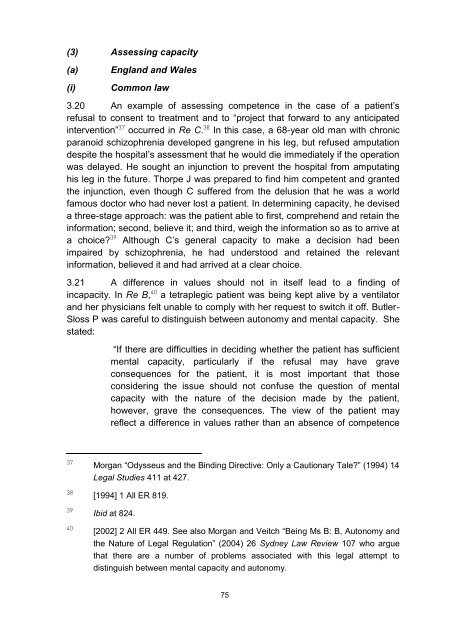Consultation Paper on Bioethics - Law Reform Commission
Consultation Paper on Bioethics - Law Reform Commission
Consultation Paper on Bioethics - Law Reform Commission
You also want an ePaper? Increase the reach of your titles
YUMPU automatically turns print PDFs into web optimized ePapers that Google loves.
(3) Assessing capacity<br />
(a) England and Wales<br />
(i) Comm<strong>on</strong> law<br />
3.20 An example of assessing competence in the case of a patient‟s<br />
refusal to c<strong>on</strong>sent to treatment and to “project that forward to any anticipated<br />
interventi<strong>on</strong>” 37 occurred in Re C. 38 In this case, a 68-year old man with chr<strong>on</strong>ic<br />
paranoid schizophrenia developed gangrene in his leg, but refused amputati<strong>on</strong><br />
despite the hospital‟s assessment that he would die immediately if the operati<strong>on</strong><br />
was delayed. He sought an injuncti<strong>on</strong> to prevent the hospital from amputating<br />
his leg in the future. Thorpe J was prepared to find him competent and granted<br />
the injuncti<strong>on</strong>, even though C suffered from the delusi<strong>on</strong> that he was a world<br />
famous doctor who had never lost a patient. In determining capacity, he devised<br />
a three-stage approach: was the patient able to first, comprehend and retain the<br />
informati<strong>on</strong>; sec<strong>on</strong>d, believe it; and third, weigh the informati<strong>on</strong> so as to arrive at<br />
a choice? 39 Although C‟s general capacity to make a decisi<strong>on</strong> had been<br />
impaired by schizophrenia, he had understood and retained the relevant<br />
informati<strong>on</strong>, believed it and had arrived at a clear choice.<br />
3.21 A difference in values should not in itself lead to a finding of<br />
incapacity. In Re B, 40 a tetraplegic patient was being kept alive by a ventilator<br />
and her physicians felt unable to comply with her request to switch it off. Butler-<br />
Sloss P was careful to distinguish between aut<strong>on</strong>omy and mental capacity. She<br />
stated:<br />
“If there are difficulties in deciding whether the patient has sufficient<br />
mental capacity, particularly if the refusal may have grave<br />
c<strong>on</strong>sequences for the patient, it is most important that those<br />
c<strong>on</strong>sidering the issue should not c<strong>on</strong>fuse the questi<strong>on</strong> of mental<br />
capacity with the nature of the decisi<strong>on</strong> made by the patient,<br />
however, grave the c<strong>on</strong>sequences. The view of the patient may<br />
reflect a difference in values rather than an absence of competence<br />
37 Morgan “Odysseus and the Binding Directive: Only a Cauti<strong>on</strong>ary Tale?” (1994) 14<br />
Legal Studies 411 at 427.<br />
38 [1994] 1 All ER 819.<br />
39 Ibid at 824.<br />
40 [2002] 2 All ER 449. See also Morgan and Veitch “Being Ms B: B, Aut<strong>on</strong>omy and<br />
the Nature of Legal Regulati<strong>on</strong>” (2004) 26 Sydney <strong>Law</strong> Review 107 who argue<br />
that there are a number of problems associated with this legal attempt to<br />
distinguish between mental capacity and aut<strong>on</strong>omy.<br />
75

















